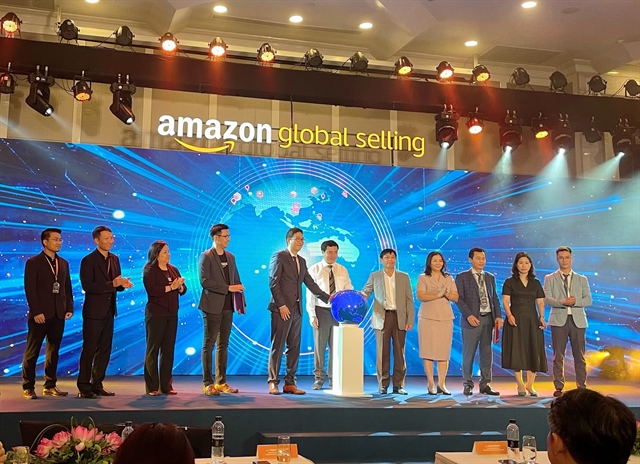_med.jpg) Economy
Economy

Amazon Global Selling and the Vietnam E-commerce and Digital Economy Agency (iDEA) under the Ministry of Industry and Trade on Wednesday signed a Memorandum of Understanding (MoU) to collaborate on the initiative to support the manpower development for enterprises to unlock opportunities with export through e-commerce.

|
| Representatives of Amazon Global Selling and iDEA at the launching event. VNS Photo Mai Hương |
HÀ NỘI — Amazon Global Selling and the Vietnam E-commerce and Digital Economy Agency (iDEA) under the Ministry of Industry and Trade on Wednesday signed a Memorandum of Understanding (MoU) to collaborate on the initiative to support the manpower development for enterprises to unlock opportunities with export through e-commerce.
The “Cross-border E-commerce: the Breakthrough Era” initiative, launched by Amazon and acknowledged by the Ministry of Industry and Trade, is a five-year programme with online and offline training boot camps across Việt Nam. It aims to support cross-border e-commerce talent for 10,000 businesses in the next five years from 2022 to 2026.
The global e-commerce market is forecast to grow strongly to reach US$7.4 trillion by 2025, driven by the impacts of new-generation free trade agreements and the shift in business models from traditional to digital platforms. This provides an opportunity for Vietnamese companies to penetrate and expand export markets on the back of Việt Nam's deep integration into the world economy.
According to Deputy Minister of Industry and Trade Nguyễn Sinh Nhật Tân, e-commerce plays an important role in driving Việt Nam’s economic development post-pandemic.
In 2021, e-commerce sales increased 16 per cent to reach $13.7 billion, of which B2C (business-to-customers) accounted for 6.5 per cent of total retail sales and service revenue. Việt Nam’s e-commerce is forecast to grow by an average of 25 per cent per year during 2022-25, reaching $35 billion by 2025 and occupying 10 per cent of total retail sales and service revenue.
Tân said the ministry has actively applied information technology to reform administrative procedures in the export sector to alleviate costs for export businesses, then boosting Việt Nam’s imports and exports.
However, he did point out there are some limitations in Vietnamese e-commerce businesses such as the lack of market information, knowledge of regulations and local consumer taste in foreign markets, weak marketing campaigns and manpower resources.
“We believe with the efforts of many sides, the programme will be a premise for us to develop more programmes to support businesses in digital transformation and bring Vietnamese goods brands out to the world through cross-border e-commerce,” Tân said.
Gijae Seong, head of Amazon Global Selling Vietnam, added: “With this MoU, iDEA and Amazon Global Selling Vietnam share the same vision and strategy to support local SMEs export through e-commerce. 10,000 Vietnamese businesses are expected to join our initiative in which small and medium enterprises can arm themselves with knowledge, information, resources and connections to sustainably expand their business globally.”
Seong revealed about 7.2 million made-in-Vietnam products were sold globally through Amazon in 2021, up 48 per cent in value compared to the previous year. Some local brands become more popular with buyers overseas such as Minh Long porcelain, Royal helmets, Trường Thọ seaweed and 3D Vietnamese handmade cards.
In 2022, this programme is planned to roll out in Hà Nội, HCM City, Đà Nẵng, and other cities across Việt Nam.
Sizeable opportunities for e-commerce exports in Việt Nam
At the event, Amazon also released the “Local Sellers, Global Consumers: Capturing Việt Nam’s e-commerce export opportunity” report, which surveyed more than 300 micro, small and medium enterprises (MSMEs) from Việt Nam.
According to the report, the annual value of B2C e-commerce exports in Việt Nam is expected to grow by over 20 per cent to reach VNĐ256.1 trillion ($11.1 billion) in 2026, from VNĐ75.4 trillion ($3.3 billion) in 2021.
“If B2C e-commerce was considered an export category, it could be the fifth largest export category in Việt Nam in five years,” the report said, noting that 64 per cent of this value could be earned by MSMEs.
About 88 per cent of surveyed firms feel e-commerce is critical for their ability to export. Vietnamese MSMEs also anticipated a greater sales growth forecast overseas (42 per cent) than at home (11 per cent).
However, amid the opportunities for global expansion, the report revealed key challenges for enterprises to overcome, including barriers in cost, regulations, information and capabilities.
More than 80 per cent of surveyed firms admitted they lack information on relevant regulations overseas while 85 per cent believe they lack the ability to compete with other sellers globally.
The report is expected to give an insightful base for authorities, policymakers and industry players to come up with comprehensive recommendations and solutions supporting e-commerce exporters. — VNS




